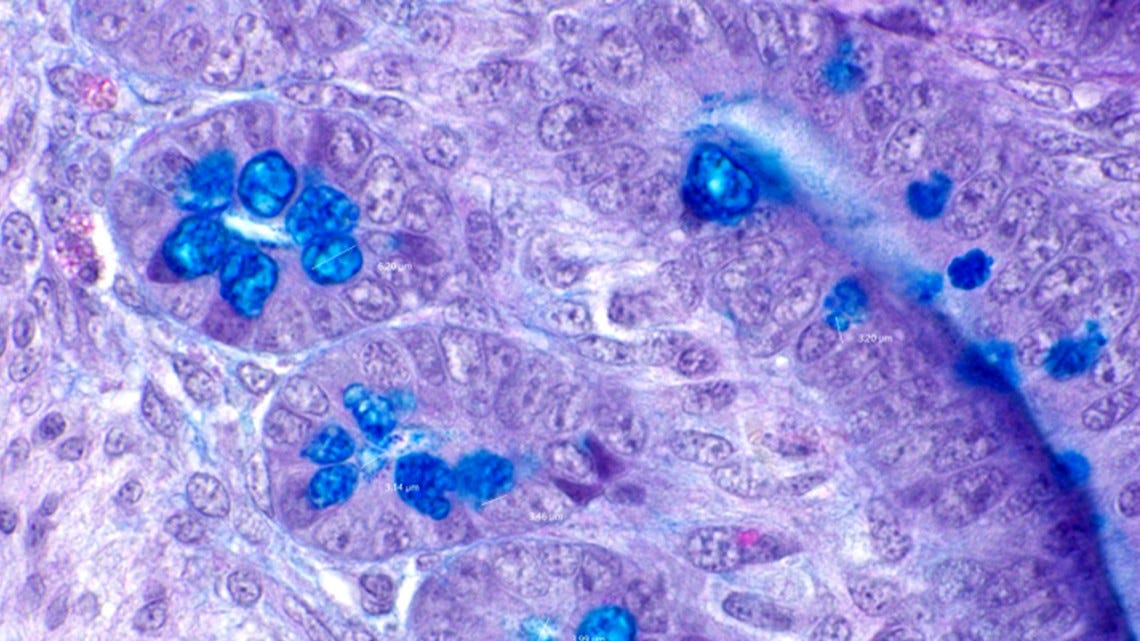Check Your Labels - Common Food Anti-Caking Ingredients Cause Intestinal Dysbiosis
Titanium dioxide and silicon dioxide harm intestinal microbiomes. These additives are everywhere.
Good morning, Popular Rationalists! News about our Summer Microbiome Course follows this article.
How often have you read the label and seen “titanium dioxide” and “silicon dioxide”, compounds used for anti-caking and to enhance color in food, and thought “I don’t know if it’s toxic or not, but it’s everywhere, so it must be safe”?
We now know amazing things about our microbiome. For example, having the right microbiome can reduce depression, impact the type and amount of certain brain cells, reverse MS in mice, improve cardiometabolic health, and increase your desire to exercise. We also know that what we eat determines the health of our microbiome, and what mothers eat impacts the health of their babies’ microbiome.
Health Microbiome Functional Requires an Intact “Brush border membrane”, the intestine’s digestive and absorptive surface.
A new study out of Cornell University shows that both titanium dioxide and silicon dioxide harm intestinal microbiomes harm intestinal function due to toxicity to the microbiome.
“We found that specific nanoparticles – titanium dioxide and silicon dioxide – ordinarily used in food may negatively affect intestinal functionality,” said senior author Elad Tako, associate professor of food science in the College of Agriculture and Life Sciences. “They have a negative effect on key digestive and absorptive proteins.”
In the study, the group used human-relevant doses of titanium dioxide and silicon dioxide in the Tako laboratory’s in vivo system, which offers a health response similar to the human body’s.
The scientists injected the nanoparticles into chicken eggs. After the chickens hatched, the scientists detected changes in the functional, morphological, and microbial biomarkers in the blood, the duodenum (upper intestine), and the cecum (a pouch connected to the intestine).
The scientists found shifts in the composition of intestinal bacterial populations. The animals’ mineral transport was affected, and the brush border membrane (the intestine’s digestive and absorptive surface) was disturbed.
“We are consuming these nanoparticles daily,” said Tako, a faculty fellow at the Cornell Atkinson Center for Sustainability. “We don’t know how much we consume; we don’t know the long-term effects of this consumption. Here, we were able to demonstrate some of these effects, which is a key to understanding gastrointestinal health and development.”
Additionally, the group examined zinc oxide, a micronutrient, and iron oxide, an iron fortification supplement. Zinc oxide nanoparticles support intestinal development, as well as a compensatory mechanism following intestinal damage. Iron oxide nanoparticles are a potential option for iron fortification, though with potential alterations in intestinal functionality and health.
Previously, the scientists conducted in vitro cellular assessments and screened different nanoparticles commonly used in the food and pharmaceutical industries. The group narrowed their research to specific metal oxide nanoparticles and ensured testing dosages that are appropriate for humans.
“Between our two universities, our research used a nice set of systems that complement each other,” said Gretchen Mahler, Ph.D. ’08, professor of biomedical engineering at Binghamton and interim vice provost and dean of the graduate school.
“We used our in vitro gut models of the small intestine to conduct assays and screen nanoparticle dosages,” Mahler said. “We then can validate what we observed in vitro by using Elad Tako’s animal model.”
Their research was published on Feb. 9 in the journal Antioxidants.
Source material: Food coloring, anti-caking nanoparticles may affect human gut | Cornell Chronicle. (Cornell University Press)






And from what I understand they can be added to supplements and other less regulated substances without any labeling. A trip through Whole Foods shows a myriad of unhealthy foods advertised as healthy.
Thanks for the information. I have started my own journey to fortify my gut with the right microbes. Made my first batch of kefir & kefir yogurt last week. Our gut health is extremely important for whole body health.